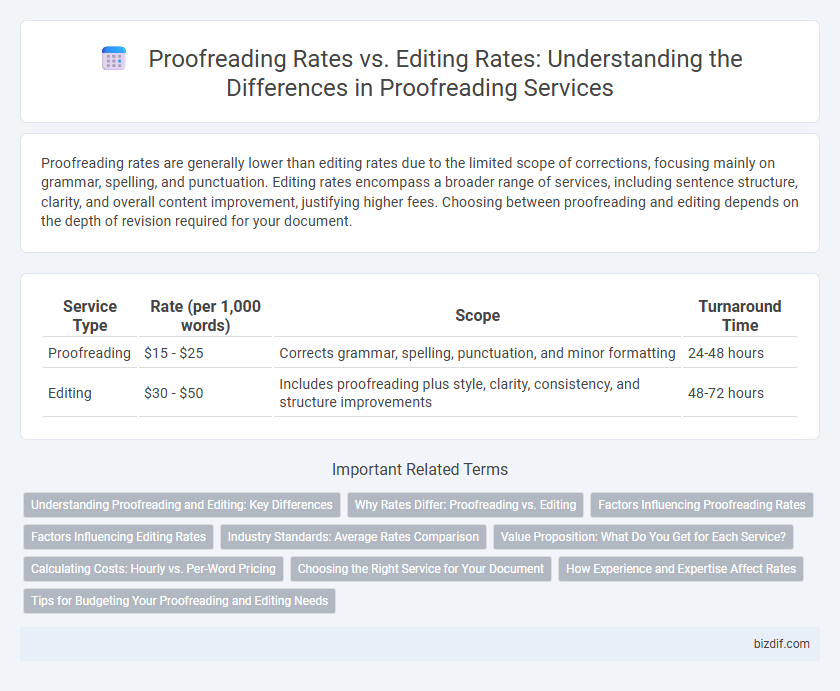Proofreading rates are generally lower than editing rates due to the limited scope of corrections, focusing mainly on grammar, spelling, and punctuation. Editing rates encompass a broader range of services, including sentence structure, clarity, and overall content improvement, justifying higher fees. Choosing between proofreading and editing depends on the depth of revision required for your document.
Table of Comparison
| Service Type | Rate (per 1,000 words) | Scope | Turnaround Time |
|---|---|---|---|
| Proofreading | $15 - $25 | Corrects grammar, spelling, punctuation, and minor formatting | 24-48 hours |
| Editing | $30 - $50 | Includes proofreading plus style, clarity, consistency, and structure improvements | 48-72 hours |
Understanding Proofreading and Editing: Key Differences
Proofreading rates typically vary between $0.01 and $0.03 per word, reflecting the task's focus on correcting surface errors such as typos, grammar, and punctuation. Editing rates range from $0.03 to $0.10 per word, encompassing deeper text improvements like restructuring sentences, enhancing clarity, and improving overall flow. Understanding these key differences in scope and effort is essential for accurately estimating project costs and selecting appropriate services.
Why Rates Differ: Proofreading vs. Editing
Proofreading rates differ from editing rates primarily due to the scope and depth of work involved; proofreading involves surface-level text corrections such as grammar, punctuation, and spelling, while editing requires deeper content restructuring, clarity improvement, and style consistency. Editors often spend more time analyzing the document's flow and coherence, justifying higher fees compared to proofreading services, which are quicker and more straightforward. The complexity and time commitment inherent in editing explain why editing rates are generally significantly higher than proofreading rates.
Factors Influencing Proofreading Rates
Proofreading rates vary based on factors such as document complexity, turnaround time, and the proofreader's expertise, with specialized content often commanding higher fees. Editing rates typically exceed proofreading costs due to the increased scope involving content restructuring and stylistic improvements. Geographic location and industry standards also significantly influence the pricing structure for both proofreading and editing services.
Factors Influencing Editing Rates
Editing rates are influenced by factors such as the complexity of the content, required depth of revisions, and the editor's expertise. Specialized subjects like legal or technical documents typically demand higher fees due to the need for industry-specific knowledge. Turnaround time and project length also impact rates, with expedited or large-scale tasks generally costing more.
Industry Standards: Average Rates Comparison
Proofreading rates typically range from $0.01 to $0.03 per word, while editing rates vary between $0.03 and $0.07 per word, reflecting the more intensive nature of editing tasks. Industry standards show that proofreading involves surface-level corrections for grammar, punctuation, and spelling, whereas editing requires structural changes, clarity improvements, and style enhancements. Freelance platforms and professional associations like the Editorial Freelancers Association provide benchmark rates that highlight this distinction, helping clients and professionals navigate fair pricing.
Value Proposition: What Do You Get for Each Service?
Proofreading rates typically range from $0.01 to $0.04 per word, focusing on correcting spelling, grammar, and punctuation to ensure polished, error-free text. Editing rates, which can vary from $0.03 to $0.10 per word, offer a more comprehensive service that includes restructuring sentences, enhancing clarity, tone, and style, as well as addressing content coherence. Choosing between proofreading and editing depends on the level of refinement needed, with proofreading providing essential final checks and editing delivering substantive improvements to overall message effectiveness.
Calculating Costs: Hourly vs. Per-Word Pricing
Proofreading rates typically range from $25 to $45 per hour or $0.01 to $0.03 per word, while editing rates are higher, often between $40 and $70 per hour or $0.03 to $0.06 per word due to the additional scope of work. Calculating costs requires evaluating project length and complexity, as hourly pricing suits shorter, intensive tasks, whereas per-word pricing benefits longer documents with predictable word counts. Understanding these rate structures helps clients and professionals budget accurately and choose the optimal pricing model for efficient quality improvement.
Choosing the Right Service for Your Document
Proofreading rates typically range from $0.01 to $0.03 per word, focusing on correcting grammar, punctuation, and spelling errors, while editing rates can be higher, between $0.03 to $0.07 per word, as they involve restructuring sentences and enhancing clarity and style. Choosing the right service depends on the document's purpose, complexity, and the level of improvement needed, with proofreading suited for final drafts and editing ideal for earlier stages. Understanding these differences ensures cost-effective results and polished, professional documents.
How Experience and Expertise Affect Rates
Proofreading rates typically range from $0.02 to $0.05 per word, while editing rates can be higher, from $0.03 to $0.08 per word, reflecting the deeper level of content refinement involved. Experienced proofreaders with specialized expertise in legal, medical, or technical fields command premium rates, often exceeding standard ranges due to the precision and subject knowledge required. Advanced training and certifications directly impact both proofreading and editing rates, as clients pay for credibility, accuracy, and efficiency in handling complex documents.
Tips for Budgeting Your Proofreading and Editing Needs
Proofreading rates typically range from $0.01 to $0.03 per word, while editing rates can vary from $0.03 to $0.07 per word depending on complexity and turnaround time. To budget effectively, assess the scope of your project and identify whether it requires light proofreading or comprehensive editing, as this will significantly impact costs. Allocate funds by prioritizing sections needing extensive revisions and consider bulk discounts or freelance platforms to optimize your proofreading and editing expenses.
Proofreading rates vs Editing rates Infographic

 bizdif.com
bizdif.com